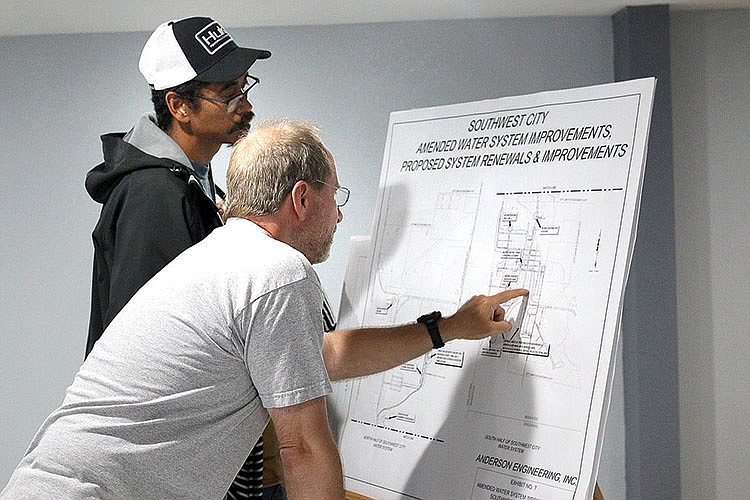The city of Southwest City asked its residents if they were in favor of passing a nearly $3 million bond issue to address deteriorating water infrastructure throughout the town. Voters overwhelmingly approved the measure last week, with 87% of votes in favor of the bond issue.
Of the estimated $2.9 million needed to complete this project, roughly two-thirds of the funds will be from a U.S. Department of Agriculture (USDA) grant and a Community Development Block grant with the remainder paid from a $1.12 million USDA loan at a 2.375% interest rate. Not all of this money must be utilized immediately; any surplus can be used as needed in the future and the city will only make payments on the sum that is actually spent.
Jeff Ceperly and Pat O’Brien of Anderson Engineering gathered with city officials and curious residents on Thursday, May 28 (four days before the election) to hold the second public hearing on the issue. Upon arrival, attendees were greeted with a poster displaying a 1934 Ford — a relic from the same era that the majority of Southwest City’s water lines were put in place.
“This was brand new, state-of-the-art technology when the water system was installed,” Ceperly said.
He then asked if anyone in the audience still drove a 1934 Ford.
“Probably not, because it has outlived its design life.”
As the vehicle aged, regular maintenance increased, similar to the water system in town.
The current system is split between two towers with differing elevations — one on the north side of Honey Creek and one to the south. Ceperly explained that the lines on the north side were installed in the 1990s using PVC pipe and the majority of lines on the south side are cast iron and nearing a century old, with lines in the southwest being the oldest and most decrepit.
The slow decline in the water system’s performance is not a new problem. In 2014, the council applied for and received a Special Evaluation Assistance for Rural Communities and Households (SEARCH) grant for an engineering report but no further action was taken at that time.
An updated engineering report was constructed by Anderson Engineering in 2019 that showed, since the last report, the north water tower had begun leaking, one well requires additional treatment due to e.coli bacteria, many hydrants have lost flow pressure and water loss has risen to an average of 70%.
Data indicates that of the 5 million gallons of water pumped in April, only 1.7 million gallons made it to the customer’s faucet. To put that in perspective, Ceperly explained that for every gallon of water that flows through the pipes and is delivered, another gallon and a half are lost via leaks along the way.
This waste is also reflected in increased chemical treatment and electrical costs to circulate the lost water.
In order to address these issues, the project scope includes constructing a new well and retiring the existing south well; erecting a new standpipe tower and retiring the leaking north tower; installing new water lines, hydrants, mains and meters; interconnecting with PWSD #3 for emergency back-feed and future expansion; and overlaying pavement where the roadway is disrupted.
O’Brien then delved into the process of repaying the USDA loan. O’Brien explained that the loan amount is determined by calculating the average household income in the community and assuming that 2% of that income will be spent on the household’s water and sewer bill. He said that in order to effectively repay the loan, the average water and sewer bill in Southwest City would need to be approximately $46 per month. The current average is $32.
While this may seem like a jump in price, O’Brien noted that it would be a flat rate and, if the system’s electricity and repair costs continued to increase, the average water bill would reach the $46 price point within 5 years with no infrastructure improvements to show for it. Without the bond issue, the average water bill is projected to reach $70 within the decade.
O’Brien added that water rates would not have to increase until the project is completed in coming years.
Ceperly and O’Brien then opened the room to questions from the audience.
Ken Brookner asked if everything west of Main Street and south of Honey Creek will be replaced. O’Brien said the only lines that won’t be replaced on the south side were installed in the ’90s and that everything else will be updated.
M ayo r D av i d B l a ke inquired about the proposed location of a new water line under Honey Creek. Ceperly said the exact location is to be determined. It will then need to be designed and installed, which would realistically take 1 to 2 years unless expedited by a government agency.

